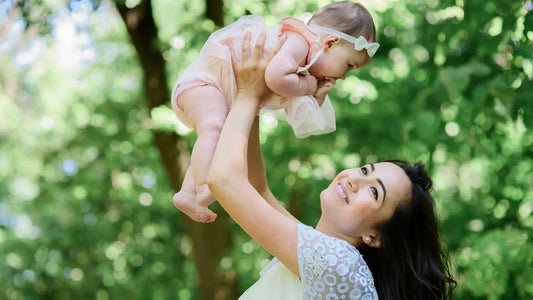May it be weather change, or the upcoming winters, there is always an instance of common cold and cough at home, especially the babies. To the parents, there is nothing worse than seeing your child develop a simple cold and be down with flu-like symptoms. Babies are most vulnerable because they have not built up their immunity yet and this means that every measure ought to be taken to shield your home against these visitors.
1. Boost Your Baby's Immune System: A strong immune system is your baby’s best defense against illness, and there are some effective ways to help strengthen it:
Breastfeeding: In the process of raising a baby, if you are able, breastfeed your baby. Breast milk contains antibodies and nutrients that help your baby’s immune system stand up against any germs.
Nutrition: If your baby takes some foods then ensure that you give them a proper balanced diet that includes fruits and vegetables. To increase their immunity, they should take foods that are rich in vitamin C such as oranges, and strawberries.
To increase nutrition one can use Immunity Syrup for Babies such as “Abhay Kavach” from Organic Dew to increase the immunity in your baby, as Baby immunity boosters are super beneficial for babies in the long-term.
Sleep: Health requires sleep to ensure that the immune defense mechanism of the body is well functioning. It is important to ensure that the baby gets enough sleep since a well-rested baby is better placed to combat any infections.
2. Practice Good Hygiene: Good hygiene habits are your first line of defense against germs.
Hand Washing: People must have good hygiene at home, and use hand wash while washing their hands. This is useful for your baby's care and upbringing, make sure others who are interacting with your baby do this as well. Since babies tend to put everything in their mouths that they come across, it is very advisable to wash your hands at any one time.
Sanitize Toys and Surfaces: Make sure to wash toys the way your pediatrician instructs so that the toys that your child puts in his/her mouth are clean. Do not also leave out areas such as door handles, and handles of mobile phones which are likely to transfer germs.
Avoid Sick Contacts: In brief, do not expose your baby to other people especially those who are infected with flu and other related illnesses. In a situation where any of the partners or both of you feel sick during pregnancy, it is important to put on a mask when handling the baby and ensure that you wash your hands.
3. Avoid Contact with People: During flu season, one should avoid human contact, especially with people who are sick and likely to infect others. This includes, for example, the malls, transport systems, and crowded centers. However, in case one has to venture out you can opt for a baby carrier instead of a stroller so that your baby remains closer to you and thus minimizes interaction with other people.
4. Create a Healthy Home Environment: Maintaining a healthy home environment can reduce the risk of your baby catching a cold.
Humidifiers: A good example is if you use a humidifier, you ensure that the air in the baby’s room is always moist, facilitating breathing, especially during winter seasons.
Smoke-Free Home: Secondhand smoking is also very hazardous for baby care and has close contact with the respiratory system as well as lowering the immune system. It is important to especially ensure that your home does not support the practice of smoking cigarettes.
5. Choose Your Baby’s Outfit Appropriately: It is important for you to dress up your baby in the right clothing according to the weather, but do not dress them too warmly. Adults should dress them in one more layer than the one they would put on if they were heading to the same climate.
6. Safe Sleep Guidelines: The baby should always be laid down to sleep on his or her back in a portable crib as shown in the picture below, which complies with the present-day safety measures. The crib mattress has to be firm and the crib mattress pad has to fit the mattress tightly; do not use a blanket in your baby’s crib, either use a swaddle or wearable blanket.
7. Know the Signs of Cold: At times your baby may be down with a cold illness despite your efforts to prevent it. Some of the symptoms include sneezing, discharge from the nose, low temperature, dry cough, easily getting irritated, loss of appetite, and others.
When to Call the Doctor: About fever if your baby is below three months, when the baby is having breathing problems, and the baby has symptoms of dehydration, for instance, the baby produces few wet diapers, and if the condition worsens it is recommended that the baby should be taken to the doctor.
Elevate the Head: However, if your baby is older than twelve months you should slightly incline the head part of the mattress to avoid congestion.
Stay Hydrated: This goes a long way in ensuring that your baby is well hydrated and that he or she gets enough liquid intake.
Conclusion: Preventing your baby from simple illnesses that are inevitable in every season entails personal hygiene and a clean surrounding alongside healthy health systems. Although you cannot shield your child from germs, these measures do much to minimize vulnerability and have your child bounce back to health if he/ she falls ill.
Shop for the Best Baby Care Products
FAQ
Q1: How can I prevent my baby from getting the common cold?
Ans: Some ways to reduce the risk of getting a common cold are: having a clean environment, washing hands with hand wash, cleaning the toys the baby uses often, and keeping the baby away from anyone who is already sick.
Q2: Why does my baby keep getting coughs and colds?
Ans: Exposure to any particular person who is already sick, and the baby having a defenseless immune system because of no pre-exposure to viruses that cause colds and coughs can be one of the reasons a baby might be experiencing colds and coughs often.
Q3: Do babies build immunity to colds?
Ans: If a baby gets exposed to cold, the body learns to defend against the virus in time, so yes, babies do build immunity to cold.
Q4: How to strengthen a baby's immune system?
Ans: Breastfeeding for the first 6 months after a baby is born, ensuring that the baby drinks plenty of water, and adequate sleep are some of the factors that are essential to strengthen a baby’s immune system.




